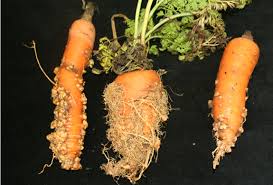Nematodes are a gardener’s worse nightmare! These microscopic worms ruin gardens by damaging vegetables and other types of plant life. They eat roots, destroying the plant’s ability to obtain nutrients and water from the soil. Plants affected by these pests become yellow, wilted or experience slower growth. They also develop knotted roots which unfortunately most gardeners or farmers do not notice until the end of the season when they are ready to harvest crops.
They are usually no greater than 1 mm in length, making them difficult to detect by the naked eye. Nematode species that are plant parasites feature mouth-parts called a stylet which allows them to pierce the cells of plants and suck out juices.
Worse yet, some nematodes species also affect humans. Infections due to nematodes species within the family Filariodidea may result in a diseases called elephantiasis, according to the World Health Organisation (WHO). This results in painful swelling all over the body and often affects individuals in tropical regions of the world.
To get rid of them, gardeners will need to apply effective nematode control measures. These include the following:
- Use Bionematicides to Kill Nematode Eggs
Bionematicides are biological, natural or non-chemical products used to kill and control nematode populations. These are environmentally friendly alternatives to chemical-based nematicides which also

Root-knot nematode on carrots
kill parasitic plant pests but have an adverse impact on both humans and animals when they contaminate soil and water sources. The bionematicide recommended by experts at the University of Florida is called MeloCon WG. It is said to be very effective in killing nematode eggs.
To apply this product, add water then spray the solution on soil or use it to drench the planting bed where nematodes have been detected. It is best used to kill nematode eggs before adult roundworms cause serious root damage to your plants.
- Add Crushed Crustacean Shells to Soil
Certain types of shells from crustaceans such as shrimp and crab attract fungi which in turn kills nematodes. This might sound a little crazy but it actually works and has been recommended by experts familiar with nematode pest control. You can purchase shrimp shell meal or shell-based fertilized at gardening or farm supply stores. Note that this method kills several nematode species including root knot nematode, a common specie found in the United States.
- Disinfect Garden Tools
If you want to protect your fruits and vegetables from nematodes, it’s best to act fast! Begin to disinfect garden tools to kill nematodes that might be present. This will make it more difficult for them to contaminate other areas within your garden. Use solution of 10% chlorine bleach to 90% water to disinfect hand tools, gardening boots and other equipment that has been used in known nematode infested sites.
- Plant Marigolds
Marigolds are known to significantly reduce nematode populations within gardens. If you have identified root knot nematodes as the culprits ruining your garden, purchase marigold varieties such as Petite Gold or Petite Harmony. Also, plant these varieties in rows about 7 inches apart to ensure adequate space for weeding. This will prevent nematodes from infesting the roots of weeds and further reduce these dangerous garden pests.
- Add Organic Matter to Soil
Organic matter can help promote the development of fungi and beneficial nematodes. These organisms can significantly reduce the population of plant parasite nematode species. Organic matter will also aid in the health of plants since they provide ideal soil composition due to the presence of good bacteria.

Organic matter helps to fight nematodes
- Implement Crop Rotation Using Nematode Resistant Crops
In addition to adding organic matter to soil, gardeners can combat nematodes through crop rotation. When rotating crops, use nematode resistant vegetables like asparagus, collards, broccoli, and sweet corn.
- Solarize Soil by Using Plastic Covers
An essential step in the solarization process is for gardeners to first till and water their garden. Afterwards, spread plastic covers over your plants for several weeks. These processes will expose the nematodes to excess sun, air and heat which will enable you to eradicate them without the use of harmful pesticides.
If you notice signs of nematode infestation such as knotted roots or yellow, wilted leaves, do not hesitate! Eradicate these pests before they ruin your garden!

No Comments